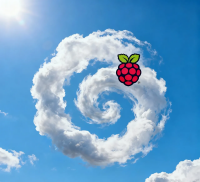 Finally, some light at the end of the tunnel! As I have said in this blog and elsewhere, after putting quite a bit of work into generating the Debian Raspberry Pi images between late 2018 and 2023, I had to recognize I don’t have the time and energy to properly care for it. I even registered a GSoC project for it. I mentored Kurva Prashanth, who did good work on the vmdb2 scripts we use for the image generation — but in the end, was unable to push them to be built in Debian infrastructure. Maybe a different approach was...
Finally, some light at the end of the tunnel! As I have said in this blog and elsewhere, after putting quite a bit of work into generating the Debian Raspberry Pi images between late 2018 and 2023, I had to recognize I don’t have the time and energy to properly care for it. I even registered a GSoC project for it. I mentored Kurva Prashanth, who did good work on the vmdb2 scripts we use for the image generation — but in the end, was unable to push them to be built in Debian infrastructure. Maybe a different approach was...Gunnar Wolf - Nice grey life
Showing posts 1 – 10
 Finally, some light at the end of the tunnel! As I have said in this blog and elsewhere, after putting quite a bit of work into generating the Debian Raspberry Pi images between late 2018 and 2023, I had to recognize I don’t have the time and energy to properly care for it. I even registered a GSoC project for it. I mentored Kurva Prashanth, who did good work on the vmdb2 scripts we use for the image generation — but in the end, was unable to push them to be built in Debian infrastructure. Maybe a different approach was...
Finally, some light at the end of the tunnel! As I have said in this blog and elsewhere, after putting quite a bit of work into generating the Debian Raspberry Pi images between late 2018 and 2023, I had to recognize I don’t have the time and energy to properly care for it. I even registered a GSoC project for it. I mentored Kurva Prashanth, who did good work on the vmdb2 scripts we use for the image generation — but in the end, was unable to push them to be built in Debian infrastructure. Maybe a different approach was...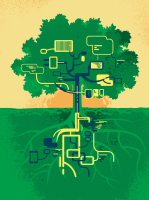 David Patterson does not need an introduction. Being the brain behind many of the inventions that shaped the computing industry (repeatedly) over the past 40 years, when he put forward an opinion article in Communications of the ACM targeting the current day political waves in the USA, I could not avoid choosing it to write this review. Patterson worked for a a public university (University of California at Berkeley) between 1976 and 2016, and in this article he argues how government-funded academic research (GoFAR) allows for faster, more effective and freer development than private sector-funded research would, putting his own...
David Patterson does not need an introduction. Being the brain behind many of the inventions that shaped the computing industry (repeatedly) over the past 40 years, when he put forward an opinion article in Communications of the ACM targeting the current day political waves in the USA, I could not avoid choosing it to write this review. Patterson worked for a a public university (University of California at Berkeley) between 1976 and 2016, and in this article he argues how government-funded academic research (GoFAR) allows for faster, more effective and freer development than private sector-funded research would, putting his own...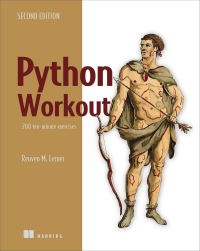 Note: While I often post the reviews I write for Computing Reviews, this is a shorter review requested to me by Manning. They kindly invited me several months ago to be a reviewer for Python Workout, 2nd edition; after giving them my opinions, I am happy to widely recommend this book to interested readers. Python is relatively an easy programming language to learn, allowing you to start coding pretty quickly. However, there’s a significant gap between being able to “throw code” in Python and truly mastering the language. To write efficient, maintainable code that’s easy for others to understand, practice...
Note: While I often post the reviews I write for Computing Reviews, this is a shorter review requested to me by Manning. They kindly invited me several months ago to be a reviewer for Python Workout, 2nd edition; after giving them my opinions, I am happy to widely recommend this book to interested readers. Python is relatively an easy programming language to learn, allowing you to start coding pretty quickly. However, there’s a significant gap between being able to “throw code” in Python and truly mastering the language. To write efficient, maintainable code that’s easy for others to understand, practice...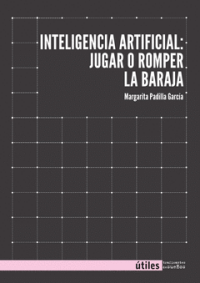 As a little disclaimer, I usually review books or articles written in English, and although I will offer this review to Computing Reviews as usual, it is likely it will not be published. The title of this book in Spanish is Inteligencia artificial: jugar o romper la baraja. I was pointed at this book, published last October by Margarita Padilla García, a well known Free Software activist from Spain who has long worked on analyzing (and shaping) aspects of socio-technological change. As other books published by Traficantes de sueños, this book is published as Open Access, under a CC BY-NC...
As a little disclaimer, I usually review books or articles written in English, and although I will offer this review to Computing Reviews as usual, it is likely it will not be published. The title of this book in Spanish is Inteligencia artificial: jugar o romper la baraja. I was pointed at this book, published last October by Margarita Padilla García, a well known Free Software activist from Spain who has long worked on analyzing (and shaping) aspects of socio-technological change. As other books published by Traficantes de sueños, this book is published as Open Access, under a CC BY-NC... Much has been written about large language models (LLMs) being a risk to user security and privacy, including the issue that, being trained with datasets whose provenance and licensing are not always clear, they can be tricked into producing bits of data that should not be divulgated. I took on reading this article as means to gain a better understanding of this area. The article completely fulfilled my expectations. This is a review article, which is not a common format for me to follow: instead of digging deep into a given topic, including an experiment or some way of proofing...
Much has been written about large language models (LLMs) being a risk to user security and privacy, including the issue that, being trained with datasets whose provenance and licensing are not always clear, they can be tricked into producing bits of data that should not be divulgated. I took on reading this article as means to gain a better understanding of this area. The article completely fulfilled my expectations. This is a review article, which is not a common format for me to follow: instead of digging deep into a given topic, including an experiment or some way of proofing... Last week, our university held a «Mega Vaccination Center». Things cannot be small or regular with my university, ever! According to the official information, during last week ≈31,000 people were given a total of ≈74,000 vaccine dosis against influenza, COVID-19, pneumococcal disease and measles (specific vaccines for each person selected according to an age profile). I was a tiny blip in said numbers. One person, three shots. Took me three hours, but am quite happy to have been among the huge crowd. (↑ photo credit: La Jornada, 2025.11.14) And why am I bringing this up? Because I have long been...
Last week, our university held a «Mega Vaccination Center». Things cannot be small or regular with my university, ever! According to the official information, during last week ≈31,000 people were given a total of ≈74,000 vaccine dosis against influenza, COVID-19, pneumococcal disease and measles (specific vaccines for each person selected according to an age profile). I was a tiny blip in said numbers. One person, three shots. Took me three hours, but am quite happy to have been among the huge crowd. (↑ photo credit: La Jornada, 2025.11.14) And why am I bringing this up? Because I have long been...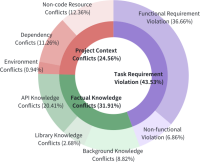 How good can large language models (LLMs) be at generating code? This may not seem like a very novel question, as several benchmarks (for example, HumanEval and MBPP, published in 2021) existed before LLMs burst into public view and started the current artificial intelligence (AI) “inflation.” However, as the paper’s authors point out, code generation is very seldom done as an isolated function, but instead must be deployed in a coherent fashion together with the rest of the project or repository it is meant to be integrated into. Today, several benchmarks (for example, CoderEval or EvoCodeBench) measure the functional correctness...
How good can large language models (LLMs) be at generating code? This may not seem like a very novel question, as several benchmarks (for example, HumanEval and MBPP, published in 2021) existed before LLMs burst into public view and started the current artificial intelligence (AI) “inflation.” However, as the paper’s authors point out, code generation is very seldom done as an isolated function, but instead must be deployed in a coherent fashion together with the rest of the project or repository it is meant to be integrated into. Today, several benchmarks (for example, CoderEval or EvoCodeBench) measure the functional correctness... One of my servers at work leads a very light life: it is our main backups server (so it has a I/O spike at night, with little CPU involvement) and has some minor services running (i.e. a couple of Tor relays and my personal email server — yes, I have the authorization for it 😉). It is a very stable machine… But today I was surprised: As I am about to migrate it to Debian 13 (Trixie), naturally, I am set to reboot it. But before doing so: $ w 12:21:54 up 1048 days, 0 min, 1 user, load average:...
One of my servers at work leads a very light life: it is our main backups server (so it has a I/O spike at night, with little CPU involvement) and has some minor services running (i.e. a couple of Tor relays and my personal email server — yes, I have the authorization for it 😉). It is a very stable machine… But today I was surprised: As I am about to migrate it to Debian 13 (Trixie), naturally, I am set to reboot it. But before doing so: $ w 12:21:54 up 1048 days, 0 min, 1 user, load average:...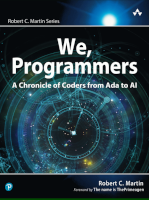 When this book was presented as available for review, I jumped on it. After all, who doesn’t love reading a nice bit of computing history, as told by a well-known author (affectionaly known as “Uncle Bob”), one who has been immersed in computing since forever? What’s not to like there? Reading on, the book does not disappoint. Much to the contrary, it digs into details absent in most computer history books that, being an operating systems and computer architecture geek, I absolutely enjoyed. But let me first address the book’s organization. The book is split into four parts. Part 1,...
When this book was presented as available for review, I jumped on it. After all, who doesn’t love reading a nice bit of computing history, as told by a well-known author (affectionaly known as “Uncle Bob”), one who has been immersed in computing since forever? What’s not to like there? Reading on, the book does not disappoint. Much to the contrary, it digs into details absent in most computer history books that, being an operating systems and computer architecture geek, I absolutely enjoyed. But let me first address the book’s organization. The book is split into four parts. Part 1,...subscribe via RSS
 Found this grafitti on the wall behind my house today:
Found this grafitti on the wall behind my house today: